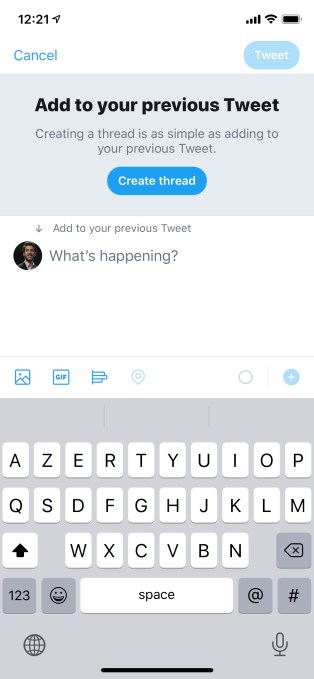Hold that tweet — and add another one.
Twitter is adding a new feature for mobile users to make it easier to link dispersed ‘shower thoughts’ together — and another thing styleee.

Per 9to5Mac, the feature — which Twitter tweeted about yesterday — is slowly rolling out to its iOS app. (At the time of writing we spotted it in Europe.)
The feature lets you pull down as you’re composing a tweet to add to your previous tweet by creating a thread or seeing a ‘continue thread’ option.
Tapping on a three-dots menu brings up an interface of older tweets which you can link the new tweet to — to continue (or kick off) a thread.
The feature looks intended to encourage more threads (from #140 characters to #280 to infinity tweetstorms and beyond!).
It may also be intended to address the broken thread phenomenon which can still plague the information network service. Especially where users are discussing complex and/or nuanced topics. (And Twitter has said it wants to foster healthy conversations on its platform so…)
The shortcut offers an alternative for Twitter users to being organized enough to tweet a perfectly threaded series of thoughts in the first place (i.e. by using the ‘+’ option at the point of composing your tweetstorm).
It also does away with the need to go manually searching through your feed for the particular tweet you want to expand on and then hitting reply to add another.
No, it’s still not an edit button. But, frankly, if you think Twitter is ever going to let you rewrite your existing tweets you should probably think longer before you hit ‘publish’ on your next one.
The ‘continue thread’ option could also be used as a de facto edit option — by letting users more easily append a correction to a preexisting tweet.
Whether the feature will (generally) work as intended — to boost threads and reduce broken threads and make Twitter a less confusing place for newbs — remains to be seen.
Happily it looks like Twitter has thought about (and closed off) one potential misuse risk. We tested to see what would happen if you try to insert a new tweet into the middle of an existing tweetstorm — which would have had the potential to generate more confusion (i.e. if the thread logic got altered by the addition).
But instead of embedding the new tweet in the middle of the old thread it was added at the bottom as a supplement. So you just start a new thread at the bottom of your old thread.
Good job, Jack.
TechCrunch’s Romain Dillet contributed to this report

Recent Comments